Manhattan Blu-ray Movie
HomeManhattan Blu-ray Movie 
The Woody Allen CollectionMetro-Goldwyn-Mayer | 1979 | 96 min | Rated R | Jan 24, 2012
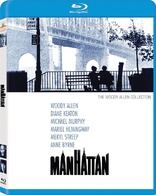
Movie rating
8.1 | / 10 |
Blu-ray rating
| Users | 4.0 | |
| Reviewer | 4.5 | |
| Overall | 4.0 |
Overview
Manhattan (1979)
A middle-aged TV writer, living in Manhattan, finds himself torn between relationships with a teenage girl who idolizes him, a thirtysomething woman who shares his intellectual passions, and an ex-wife who left him for another woman.
Starring: Woody Allen, Diane Keaton, Mariel Hemingway, Meryl Streep, Michael Murphy (I)Director: Woody Allen
| Drama | 100% |
| Romance | 36% |
| Comedy | Insignificant |
Specifications
Video
Video codec: MPEG-4 AVC
Video resolution: 1080p
Aspect ratio: 2.34:1
Original aspect ratio: 2.39:1
Audio
English: DTS-HD Master Audio 2.0 Mono (48kHz, 24-bit)
Spanish: Dolby Digital 2.0 Mono (224 kbps)
French: DTS 2.0 Mono
German: DTS 2.0
Italian: DTS 2.0
Spanish: DTS 2.0 Mono
Subtitles
English SDH, French, German, Italian, Japanese, Portuguese, Spanish, Dutch, Polish
Discs
50GB Blu-ray Disc
Single disc (1 BD)
Playback
Region free
Review
Rating summary
| Movie | 4.5 | |
| Video | 4.0 | |
| Audio | 4.0 | |
| Extras | 0.5 | |
| Overall | 4.5 |
Manhattan Blu-ray Movie Review
Woody Allen's ode to New York and complicated love.
Reviewed by Casey Broadwater January 22, 2012In an interview with Time Magazine shortly after the semi-scandalous news broke that he was having a relationship with his former lover Mia Farrow's
21-year-old adopted daughter, Soon-Yi, Woody Allen famously replied, "The heart wants what it wants. There's no logic to those things. You meet
someone and you fall in love and that's that." The quote is a good entry point into Allen's 1979 film, Manhattan, which is very much about the
irrationality of love, broadly, and more specifically about his character's relationship with a significantly younger, high school-aged girl. Though
Allen has always been careful to draw a line between his movies and his own life--in fact, he claims there's never any autobiographical connection
whatsoever--it's hard not to see Manhattan as prescient in retrospect.
But let's not get bogged down in the distinctions between fiction and reality. Manhattan may bear some resemblance to events in Allen's life,
but the film is bigger than that, encompassing the entire moral and cultural milieu of 1970s liberal intellectuals in New York, a psychoanalyzed and self-
medicated social set whose best relationships were with themselves. Of course, the film is also a black and white ode to the city, glamorized and
sentimentalized here and made wonderfully timeless. If Annie Hall is where Woody Allen matured as a storyteller, Manhattan is where
he could finally back up his narrative substance with visual style.
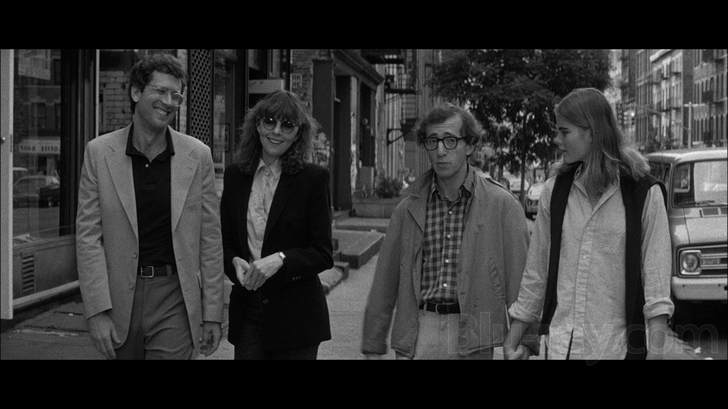
And what style. Shot in gorgeous widescreen black and white, the film eschews a credit sequence and opens immediately with a montage of New York skyline vistas. Instead of a superimposed text title, Allen simply shoots a blinking neon sign that reads Manhattan in all-caps, a proclamation of place if there ever was one. It's sounds cliche, but New Yorkis a character in the film, and if the metropolis has a love interest here, it's the music of composer George Gershwin. The first sound we hear is the iconic opening clarinet trill of "Rhapsody in Blue"--a song that immortalizes the city in its bustling, jazzy heyday--and Allen uses Gershwin extensively throughout the film, from "I've Got a Crush on You" to "Sweet and Low Down," "Embraceable You" to "S'Wonderful."
The simple, wistfully romantic tunes act as a counterpoint to Allen's shrugging assertion that love is complicated, fleeting, and futile, but still somehow worthwhile. This, of course, is a variation on the theme he started in Annie Hall, a screwball comedy with existential undertones and the film where he really got focused and serious as a director. After Annie Hall he made the Bergmanesque Interiors, his first pure drama, and Manhattan--not to oversimplify--feels like a near-equal blending of the two, a philosophical comedy that mucks around in the messiness of real human emotion.
His various characters often seem like the same exact psyche under different names, so we're all intimately familiar with the usual Woody Allen schtick--the layered neurosis and quick-fire kvetching, the sexual hang-ups, self-loathing, and anti-Semitic paranoia. In Manhattan, he dons the personality again as the 42-year-old schlimazel Isaac Davis, a dissatisfied television writer who's looking for a catalyst to quit his job and work full-time on his novel about "decaying values." Some might see Isaac's own life as an example of New Yorkers' eroded morality, since he's been divorced twice--his most recent ex, played terrifyingly by Meryl Streep, left him for another woman--and he's now sexually involved with the 17-year- old Tracy (Mariel Hemingway), a Dalton High School senior and amateur Lolita. Tracy's quite mature for her age, but she's still young when it comes to matters of the heart, and while Isaac has a good time with her, their romance clearly isn't going to go the distance. ("I've never had a relationship with a woman that lasted longer than the one between Hitler and Eva Braun," he jokes.)
Isaac isn't the only one in illicit, inevitably short-term love. His best friend, Yale (Michael Murphy) is sneaking around behind his wife Emily's (Anne Byrne) back with the snobby-but-spirited journalist Mary Wilkie (Diane Keaton), and he's not sure if or how he wants the relationship to progress. When Yale smartly breaks things off with Mary, he urges her onto Isaac, and this, naturally, is where the situation gets complicated and morphs into an incredibly unstable love quadrangle. Isaac is initially put off by Mary's intellectual brashness--they get off to a poor start when she calls his taste in art "bullshit" and then slams Ingmar Bergman--but they begin to fall for one another after an accidental evening on the town, one that concludes with the two sitting on a park bench under the Queensboro Bridge at dawn. (The film's most iconic shot and one of the best New York cinema moments ever.) I'll say no more about how this particular romantic house of cards collapses, but suffice it to say that Yale hasn't lost his feelings for Mary, and Isaac hasn't lost his own for Tracy, who's set to leave New York for London to attend the Royal Academy. The heart may want what it wants, but trouble comes when the heart can't make up its mind, breaking others in the process.
The relationship drama is poignant and honest, but it's only one thread of what is arguably Woody Allen's richest, most detailed cinematic tapestry. There's also the simultaneously realistic and romanticized portrayal of 1970s New York, with its Equal Rights Amendment fundraising events and Central Park carriage rides, its dingy apartments and moonlit promenades. Manhattan captures the city as it was and as Allen wishes it could always be. Of course, it goes without saying that the film is exceptionally funny and eminently quotable. Allan and Marshall Brickman's script is sharp and smart, tearing through cultural references from August Strindberg to Noel Coward, from luckless psychoanalysis to the wrong kind of orgasms. ("You had the wrong kind? I've never had the wrong kind. Ever. My worst one was right on the money.") The performances are collectively wonderful. Woody is...well, his always entertaining self, and Diane Keaton--the Hepburn to his Tracy--is a completely different beast from her Annie Hall character, savagely intelligent where Annie was a total ditz. But it's Mariel Hemingway--nominated for a Best Supporting Actress Oscar--who steals our hearts as the naive Tracy, a sexually experienced but emotionally vulnerable innocent who teaches Isaac to set aside his cynicism.
Manhattan Blu-ray Movie, Video Quality 
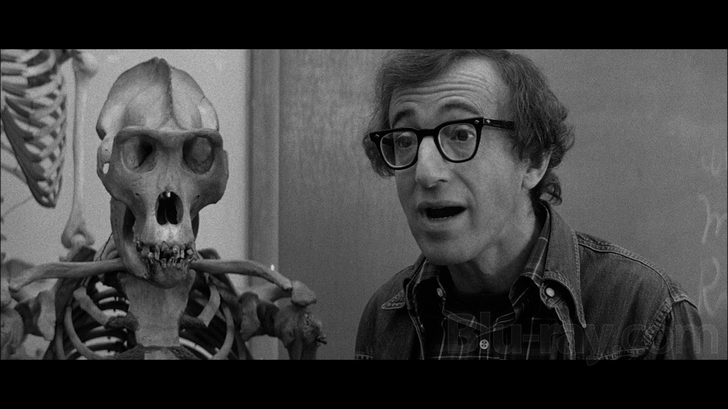
Manhattan looks gorgeous on Blu-ray, even more so than Annie Hall. With its stark black and white cinematography it's obviously the more stylized of the two, and MGM's 1080p/AVC-encoded transfer more than does it justice. To start, the print is in nearly immaculate condition. I don't know if it was extremely clean to begin with, or if MGM spent the time and effort to do a frame-by-frame restoration, but either way the results are fantastic. There are very few white specks to be noticed throughout the film, and no major debris or staining or brightness flickering. The 35mm image is faithfully presented here, with a natural-looking grain pattern--which is admittedly somewhat heavy at times--and no apparent digital noise reduction, edge enhancement, or other forms of unnecessary filtering or boosting. There are no real compression or encode issues either. While the film isn't always sharp sharp, clarity is greatly improved over previous standard definition editions, with fine detail--like in threading of Woody's sports jackets--that you've probably never noticed before. If I have one concern, it's that the tonal balance seems to be shifted very heavily toward the shadows. The film has always been kind of dark, but it does seem possibly a bit too dim here. I'll give MGM the benefit of the doubt, though. Overall, Manhattan looks wonderful.
Manhattan Blu-ray Movie, Audio Quality 
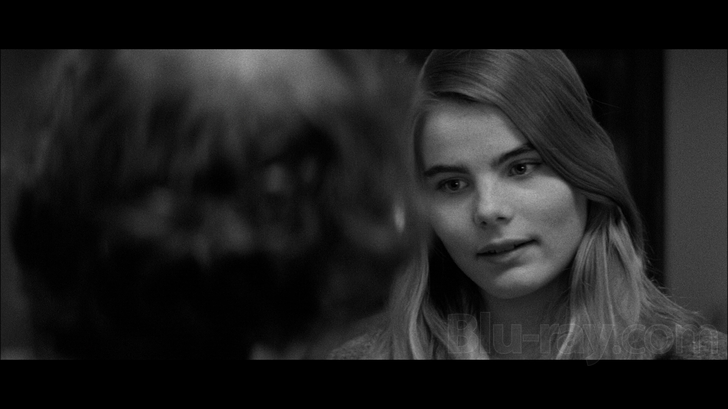
As with Annie Hall, MGM has wisely avoided trying to wrangle a 5.1 surround sound presentation out of the film's original single-channel soundtrack, opting instead for a faithful DTS-HD Master Audio 2.0 mono mix. And it sounds great. Of course, this being a Woody Allen film, where characters do nothing but talk, a good 80% of the aural activity is dialogue. Thankfully, then, the vocals are always clean and easily understood. There are a few spots where the volume of the voices seems potted a bit low, but never to the point where you'll feel like you need to grab your remote and make some adjustments. If you're familiar with the film, you already know that it's practically an introduction to George Gershwin, featuring a number of the composer's jazzy, classical Americana pieces. (Most notably, "Rhapsody in Blue," which opens the film.) The music sounds lovely--rich and full and lively. The disc also includes a number of foreign language dubs in Dolby Digital Mono--it's fun to to listen to the various voice actors do their own takes on Woody--and there are lots of subtitle options too, for those who might need or want them.
Manhattan Blu-ray Movie, Special Features and Extras 
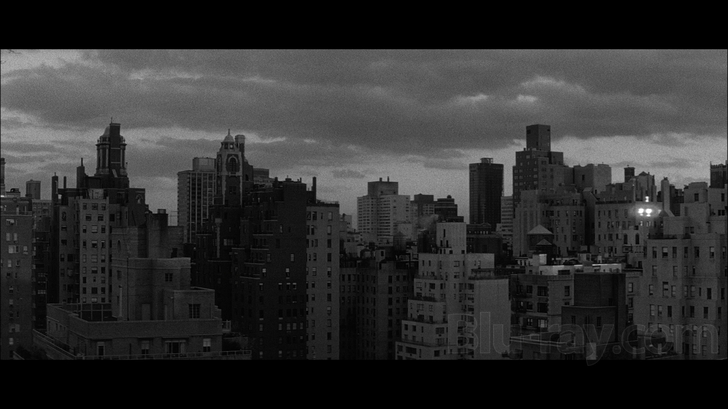
Woody Allen just doesn't do bonus features--he never has--so the only extra you'll find on the disc is the film's theatrical trailer, in high definition.
Manhattan Blu-ray Movie, Overall Score and Recommendation 
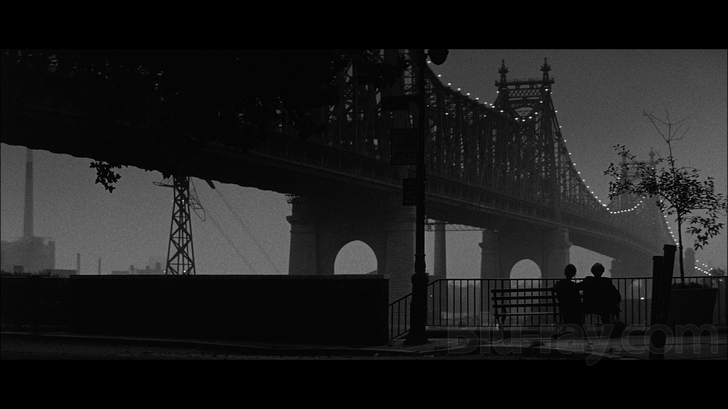
The jury is still out on whether or not Manhattan is Woody Allen's masterpiece--personally, I'm more fond of Annie Hall--but there's no doubt that this is a great film and, more specifically, a great film about New York. As far as I'm concerned, it belong in every Blu-ray collection, and MGM's fantastic 1080p transfer should easily convince you to add it to yours. There are no extras to speak of--Woody Allen is notoriously against bonus features--but the bump in picture quality is reason enough to upgrade from the DVD. Highly recommended!
Similar titles
Similar titles you might also like

Annie Hall
The Woody Allen Collection
1977

Hannah and Her Sisters
The Woody Allen Collection
1986

You Will Meet a Tall Dark Stranger
2010

Midnight in Paris
2011

Vicky Cristina Barcelona
2008

September
Limited Edition to 3000 - SOLD OUT
1987

Stardust Memories
1980

To Rome with Love
2012

New York Stories
1989

Crimes and Misdemeanors
1989

Limelight
1952

Mistress America
2015

The English Teacher
2013

Solitary Man
2009

Vanya on 42nd Street
1994

The Landlord
1970

The Apartment 4K
1960

Submarine
2010

Marriage Story
2019

An Unmarried Woman
1978